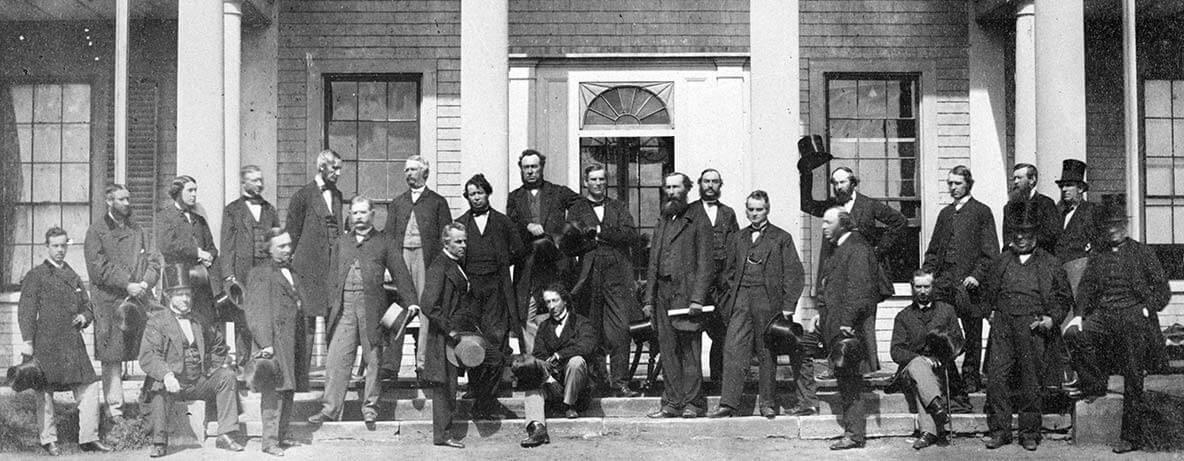The Honourable Samuel L. Tilley, Provincial Secretary of New Brunswick, responded as follows, on behalf of his Province:
He said that the manner in which the toast had been received showed how deep and earnest was the general feeling respecting the grave question on which the Intercolonial Conference was engaged. His friend, the Hon. Dr. Tupper, had said he felt embarrassed, and he, too, felt embarrassed at observing a certain table (the reporters’ table), but at the same time he was reassured by the great forbearance these gentlemen had shewn on a recent occasion when several of them visited the Maritime Provinces (Laughter and cheers.).
The delegates from the Lower Provinces were not here seeking this union. They had assembled at Charlottetown a few weeks ago, in order to see whether they could not extend their own family relations, and then Canada intervened, and the consideration of the larger question was the result. He considered it right to make this remark, inasmuch as it had been asserted in certain quarters that the Maritime Provinces, weak and impoverished, were endeavouring to attach themselves to Canada, in order to reap the benefits arising from such a union.
This was not the case. Look at the immense amount of shipping they owned. He was in a position to state that, for the year 1864, after paying the interest on all their debts, and after providing liberally for roads, bridges, and other public works, they would have a surplus of half a million. (Cheers.) Therefore, they were not coming in as paupers – but were coming to put something into the capital that was worth having.
Next alluding to the Intercolonial Railway project, he said their feeling on this subject was – “We won’t have this union unless you give us the railway.” (Cheers.) It was utterly impossible we could have either a political or commercial union without it. With regard to the latter, he might say that he had at one time believed with others that we could have a commercial without a political Union; but he now held with his honourable friend (Mr. Tupper) that it was all but impracticable, as was easily shewn by the question of tariffs, to which that honourable gentlemen had referred.
Without going into details, he might say that it was the opinion of the Conference that union was desirable if the details would be satisfactorily arranged. Of course, in making these arrangements we should have to have due regard to the wants, requirements and even, in some degree, to the prejudices of the people. Even in the Lower Provinces the tariffs acted adversely to each other. He asked them as commercial men was it desirable that this state of affairs should continue? (Cries of “No,” “No.”) He saw no other way of obviating those difficulties than by a political union.
He would not now refer at any great length to the defence question, inasmuch as we had here the gallant Colonel from Prince Edward Island (Colonel Gray) who had made it his special study.
He would, however, remark that the anxiety respecting the subject of defence in New Brunswick was not intense among the masses of the people. This was because the population was very small, and the people felt that their individual efforts would be useless. But throw the three hundred thousand souls of New Brunswick in with the population of Canada and the other provinces, making a total of four millions; and twice as much in the way of a defence contingent might be obtained from New Brunswick, because the people would feel that they were part of a great nation. (Cheers.)
If details could be satisfactorily arranged it was advisable we should be united in one great Confederation. Look, for instance, at the example offered by Canada. Since the union of Canada its population had increased from a little over a million to two millions and a half. He (Mr. Tilley) hoped for the best; and with the intelligence of which the Conference was composed, he trusted they would overcome all difficulties; and that they would soon meet in Quebec, Montreal, or Ottawa, to consummate the union – despite the caution of his friend the President. (Laughter and cheers.)


